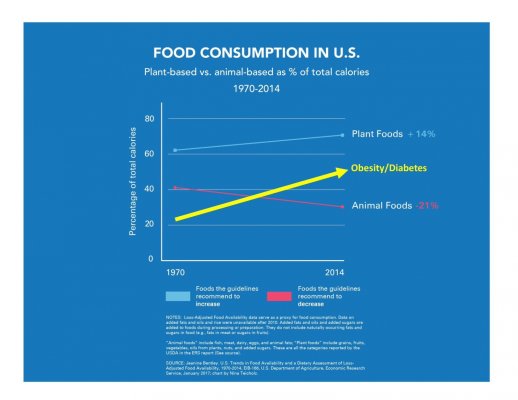audreyh1
Give me a museum and I'll fill it. (Picasso) Give me a forum ...
Over the past several decades, people in the US have reduced their intake of meat and fat including saturated fat (as recommended by the guidelines), and replaced with carbohydrates, and we’ve seen an explosion of chronic disease, rapidly increasing since the early 80s. Countries like the UK have followed the US guidelines and experienced the same worsening health results.
US guidelines drive food programs in US schools and hospitals, food assistance programs, and the military, so it’s pervasive. And US dieticians overwhelmingly will counsel their clients to follow the high carb US guidelines, as they were trained to do, regardless of the client’s metabolic impairment. So people become trapped in chronic, progressive diseases that are increasingly treated by drugs.
The original guidelines never had solid scientific evidence behind them, and the situation has improved just a little. Only in 2015 were restrictions on dietary fat and cholesterol dropped.
Personally I think it’s insane that other countries want to follow the US dietary guidelines since we are a very sick nation.
We were far healthier as a nation in terms of chronic disease before the US govt decided that dietary guidelines should be established and were appropriate for everyone.
So either the dietary guidelines are bad, or they are useless. I suppose each of us can decide for ourselves which is true.
US guidelines drive food programs in US schools and hospitals, food assistance programs, and the military, so it’s pervasive. And US dieticians overwhelmingly will counsel their clients to follow the high carb US guidelines, as they were trained to do, regardless of the client’s metabolic impairment. So people become trapped in chronic, progressive diseases that are increasingly treated by drugs.
The original guidelines never had solid scientific evidence behind them, and the situation has improved just a little. Only in 2015 were restrictions on dietary fat and cholesterol dropped.
Personally I think it’s insane that other countries want to follow the US dietary guidelines since we are a very sick nation.
We were far healthier as a nation in terms of chronic disease before the US govt decided that dietary guidelines should be established and were appropriate for everyone.
So either the dietary guidelines are bad, or they are useless. I suppose each of us can decide for ourselves which is true.
Last edited:


